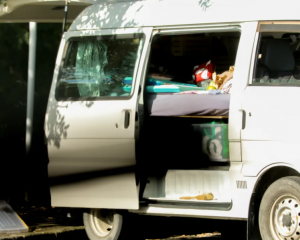
But Emily Sanson-Rejouis, 37, whose husband died in the quake, still does not know the fate of her two other daughters.
Her daughter Alyahna was pulled from the wreckage of the hotel in capital Port-au Prince where the family were staying yesterday.
But Alyahna's two sisters Kofie-Jade, five, and Zenzie, three, remain missing after the magnitude 7 earthquake ripped Haiti apart.
United Nations aid worker Mrs Sanson-Rejouis' husband, Emmanuel was found dead in the rubble.
Mrs Sanson-Rejouis and Alyahna are staying in the Dominican Republic where the toddler is being treated for several injuries including at least one broken leg.
Mrs Sanson-Rejouis' step-brother, Jamie Larnach of Auckland, said her missing daughters were "lovely, gorgeous little girls".
Mrs Sanson-Rejouis' father Roger, mother Jennie Wilson Sanson and sister Rachel left New Zealand last night for Miami, and Emmanuel Rejouis' family members in Florida were trying to get to the Dominican Republic to support Emily and Alyahna, Mr Larnach said.
Meanwhile New Zealand aid workers are on standby to help in Haiti.
New Zealand has contributed $1 million to international relief efforts, and Foreign Minister Murray McCully said yesterday there was a "sense of powerlessness" not only because New Zealand had no rescue capacity on the ground, but others who did have that capacity on the ground had had it flattened.
Mr McCully said international agencies would need to assess what could be done to help.
"New Zealand would want to be associated with that work, if there's any way in which we could be useful without getting in the way."
He had told the US Secretary of State Hillary Clinton that if there were some specialist areas in which New Zealand services were able to assist, it would very quickly put people in place.
The disaster prompted Mrs Clinton to postpone her visit to New Zealand in order to focus on coordinating US relief efforts.
She told reporters she planned to reschedule her visit to New Zealand -- "where we've forged close working ties with the new government over the past year and we're going to continue to deepen those as we move forward".
New Zealanders with concerns about the welfare of family in Haiti should telephone the Ministry of Foreign Affairs and Trade on 04-439 8000.
Unicef, Red Cross, World Vision, TEAR Fund, Oxfam and Caritas are coordinating appeals in New Zealand.
New Zealand Red Cross, which had put $50,000 towards its international body's appeal, said it would immediately send people or supplies if requested.
It could only accept financial donations, as additional people and goods could create more burden for an already strained infrastructure.
New Zealand Red Cross international operations manager Andrew McKie said survivors needed clean drinking water, and were in crowded, unsanitary conditions, with many people suffering mental shock in addition to physical injuries.
Mr McKie said his initial concern would be for people who suffered small injuries from the quake, and now faced infections.
Red Cross could put in portable hospitals as big as 300 beds, but that was a drop in the ocean when millions of people were affected.
The International Red Cross has estimated three million people will require aid, ranging from shelter to food and clean water, and that many Haitians could need relief for a full year -- with the next cyclone season expected to start in June.
Mr McKie that a rule of thumb in such earthquakes was that if people were not dug out of collapsed buildings in the first 24 hours, very few trapped people would survive longer under the rubble.












